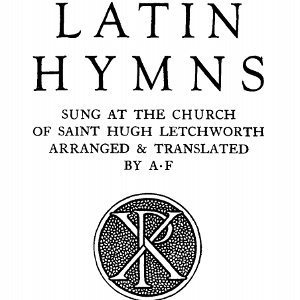
 YMNS CAN SOOTHE A FRAZZLED soul. There is a rhythm to them which invites singing along. The mind can tune in gradually. There is the repetition—by three verses you can usually join in, even if you never heard it before.
YMNS CAN SOOTHE A FRAZZLED soul. There is a rhythm to them which invites singing along. The mind can tune in gradually. There is the repetition—by three verses you can usually join in, even if you never heard it before.
There is a whole treasure trove of Latin hymns. I have had a go at collecting them over at A New Book of Old Hymns. The thing that started me collecting was hoping to sing along with understanding. The choir would sing from their Libers and there were no translations easily available in the pew.
Now I know there have been many similar collections made, such as
• 1957 Mass and Vespers with Gregorian Chant—the Liber Usualis with English translations;
• The Parish Book of Chant by Richard Rice 2013;
• Chants of the Church, 1953 and again in 1954 with modern notes, available under Additional chant anthologies at Musica Sacra’s collection of Latin Chant and also in print through Lulu;
• and Latin Hymns by Fr Adrian Fortescue.
This latter is beautifully done. It is designed for a particular congregation, as described in the preface:
This book is meant to serve a practical purpose. In our church on Sunday evening, during and after Benediction, we sing various Latin hymns or antiphons. Since Compline hardly ever changes, an excellent way to remember the feast of season is to sing the Vesper hymns of the day, with its versicle and collect at Benediction. We have also a number of beautiful hymns about the Blessed Sacrament, our Lady, the Church, and so on. But if people do not understand what is sung, to them all is lost. […]
Even if we do not have the chance to adorn a Sunday evening’s Benediction of the Blessed Sacrament in a church, we can enjoy these hymns whenever and wherever we have the chance.
